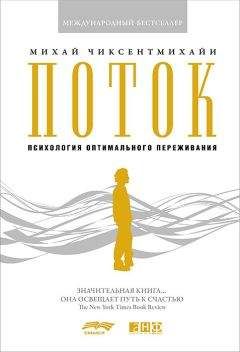Ознакомительная версия.
Miller, J. B. 1976. Toward a new psychology of women. Boston: Beacon Press.
Miller, G. A. 1983. Informavors. In The study of information, ed.
F. Machlup and U. Mansfield. New York: Wiley.
Monod, J. 1971. Chance and necessity. New York: Random House.
Monti, F. 1969. African masks. London: Paul Hamlyn.
Moore, R., and D. Gilette. 1990. King, warrior, magician, lover: Rediscovering the archetypes of the mature masculine. New York: Harper & Row.
Mote, F. 1971. Intellectual foundations of China. New York: Alfred A. Knopf.
Mumford, L. 1938. The culture of cities. New York: Harcourt-Brace.
Munro, D. 1988. Images of human nature: A Sung portrait. Princeton, N. J.: Princeton University Press.
Murray, C. 1988. In pursuit of happiness and good government. New York: Simon & Schuster.
Myers, D. G. 1992. The pursuit of happiness. New York: William Morrow & Co.
Neisser, U. 1976. Cognition and reality: Principles and implications of cognitive psychology. San Francisco: Freeman.
Nietzsche, F. [1883–1885] 1930. Also Sprack Zaratkustra. Leipzig: Kronen.
Noelle-Neumann, E. 1983. Spiegel-Dokumentation: Personlichkeitsstarke. Hamburg: Spiegel-Verlag.
O’Brian, P. 1993. Joseph Banks: A life. Boston: David Godine. Orwell, G. 1949. Nineteen eighty-four. London: Seeker & Warburg.
Pareto, V. 1917. Traite de sociologie generate. Vol. 1. Paris.
—. 1919. Traite de sociologie generate. Vol. 2. Paris.
Parsons, T. 1951. The social system. Glencoe, 111.: The Free Press. Peters, T. 1991. The cosmic self. San Francisco: HarperCollins. Philips, K. P. 1990. The politics of rich and poor: Wealth and the American electorate in the Reagan aftermath. New York: Random House.
Piaget, J. 1951. Play, dreams and imitation in childhood. New York: W. W. Norton.
—. 1971. Biology and knowledge. Chicago: University of Chicago Press.
Polanyi, K. 1957. The great transformation. Boston: Beacon Press. Popper, K. [1945] 1963. The open society and its enemies. New York: Harper & Row.
Price, S. 1989. Primitive art in civilized places. Chicago: University of Chicago Press.
Prigogine, I., and I. Stengers. 1984. Order out of chaos. New York: Bantam.
Privette, G. 1983. Peak experience, peak performance, and flow: A comparative analysis of positive human experiences. Journal of Personality and Social Psychology 45 (no. 6): 1361-68.
Privette, G., and C.M. Bundrick. 1991. Peak experience, peak performance, and flow: Personal descriptions and theoretical constructs. Journal of Social Behavior and Personality 6 (no. 5): 169-88.
Radakrishnan, S. 1956. East and west. New York.
Rathunde, K. 1989. The context of optimal experience: An exploratory model of the family. New Ideas in Psychology 7: 91–97.
Rathunde, K., and M. Csikszentmihalyi. 1991. Adolescent happiness and family interaction. In Parent-child relations throughout life, ed. K. Pillemer and K. McCartney, 143-62. Hillsdale, N. J.: Lawrence Erlbaum.
Renfrew, C. 1986. Varna and the emergence of wealth in prehistoric Europe. In The social life of things, ed. A. Appadurai, 141-68. New York: Cambridge University Press.
Renninger, K. A., S. Hidi, and A. Krapp. 1992. The role of interest in learning and development. Hillsdale, N. J.: Lawrence Erlbaum.
Richards, R. J. 1988. The moral foundations of the idea of evolutionary progress: Darwin, Spencer, and the neo-Darwinians. In Evolutionary progress, ed. M.H. Nitecki, 129-48. Chicago: University of Chicago Press.
Robinson, D. 1969. The climber as a visionary. Ascent 9: 4-10.
Robinson, J. P. 1977. How Americans use time. New York: Praeger.
Rosenblith, J., and J. Sims-Knight. In the beginning: Development in the first two years of life. Monterey, Calif: Brooks/Cole.
Rozin, P., and A.E. Fallon. 1987. A perspective on disgust. Psychological Review 94: 23–41.
Rudmin, F. W. 1991. To have possessions: A handbook on ownership and property. A special issue of the Journal of Social Behavior and Personality 6 (no. 6).
Rudolph, S., and L. Rudolph. 1978. Rajput adulthood: Reflections on the Amar Singh diary. In Adulthood, ed. E. Erikson, 149-72. New York: W.W. Norton.
Russell, B. 1991. La Conquista della Felicita. (Originally: The Conquest of Happiness. London: Allen & Unwin, 1930). Milano: Editori Associati.
Sachs, O. 1993. Making up the mind. The New York Review of Books (8 April): 42–48.
Sahlins, M. D. 1972. Stone-age economics. Chicago: Aldine Press.
Saint-Exupery, A. [1931] 1966. VoldeNuit. London: Heineman.
Sartre, J.P. 1956.Being and nothingness. New York: Philosophical Library.
Schiefele, U. 1991. Interest, learning, and motivation. Educational Psychologist 26 (nos. 3 and 4): 299–323.
—. 1991a. Slavery alive and well in Asia. Chicago Tribune, 17 November.
—. 1991b. Children modern-day serfs in Asia’s merciless sweatshops. Chicago Tribune, 18 November.
—. 1991c. Girls from Manila awaken to nightmare in Japan. Chicago Tribune, 20 November.
—. 199Id. China’s slavers willing to murder to cover tracks. Chicago Tribune, 21 November.
Scitovsky, T. 1976. The joyless economy. New York: Random House.
Seligman, М. E. P. 1975. Helplessness: — On depression, development, and death. San Francisco: Freeman.
—. 1990. Learned optimism. New York: Alfred A. Knopf.
Shweder, R. A., M. Mahapatra, andj. G. Miller. 1990. Culture and moral development. In Cultural psychology: Essays on comparative human development, ed. J. W. Stigler, R. A. Shweder, and G. Herdt, 130–204. New York: Cambridge University Press.
Simon, H. A. 1988. Creativity and motivation: A response to Csikszentmihalyi. New Ideas in Psychology 6 (no. 2): 177-81.
Simonton, D. K. 1988. Scientific genius: A psychology of science. New York: Cambridge University Press.
Sniith, А. 1992. Better than myth. In The last best place, ed. W. Kittredge and A. Smith. Seattle: University of Washington Press.
Sorokin, P. 1962. Social and cultural dynamics. New York: Bedminster.
Sperry, R. W. 1984. Consciousness, personal identity, and the divided brain. Neuropsychologia 22: 661-73.
—. 1988. Psychology’s mentalist paradigm and the religion/sciencetension. American Psychologist 43: 607-13.
Spiro, М. E. 1987. Culture and human nature: Theoretical papers ofMelfordE. Spiro. Chicago: University of Chicago Press.
Sternberg, R. J. 1990. Wisdom: Its nature, origins, and development. New York: Cambridge University Press.
Sternberg, R. J., and J. Kolligian, Jr. 1990. Competence considered. New Haven, Conn.: Yale University Press.
Strack, F., M. Argyle, and N. Schwartz, eds. 1990. The social psychology of subjective well-being. New York: Pergamon.
Szalai, A., ed. 1965. The use of time: Daily activities of urban and suburban populations in twelve countries. Paris: Mouton.
Tackett, M. 1991. Big-time debtor guides $500 million RTC deal. Chicago Tribune, 1 November.
Thompson, E. P. 1963. The making of the English working class. New York: Viking.
Toscano, M. 1986. Scuola e vita quotidiana: Un caso di selezione cul-turale. In L’esperienza quotidiana, ed. F. Massimini and P. Inghilleri, 305-18. Milan: Franco Angeli.
Tiger, L. 1992. The pursuit of pleasure. Boston: Little, Brown.
Tolman, E. C. 1948. Cognitive maps in rats and men. Psychological Review 55: 189–208.
Tonoue, R. 1992. Assessing sport-related mental states using Experience Sampling Method. Unpublished manuscript, Fukuoka University, Fukuoka, Japan.
Toynbee, A. J. [1936] 1954. A study of history. 10 Vols. Oxford: Oxford University Press.
Tucker, R. C, ed. 1972. The Marx-Engels reader. New York: W.W. Norton.
Turkle, S. 1984. The second self: Computers and the human spirit. New York: Simon & Schuster.
Turnbull, С. M. 1961. The forest people. Garden City, N. Y.: Doubleday.
Tversky, A., and D. Kahneman. 1986. Rational choice and the framing of decisions. Journal of Business 59 (no. 4): 251-78.
Tybor. J. 1992. Interview with Jerome Bettis. Chicago Tribune, 11 September.
UNICEF. 1990. The State of the World’s Children 1990. New York: Oxford University Press.
Vasari, G. [1550] 1959. Lives of the most eminent painters, sculptors, and architects. New York: The Modern Library.
Waddington, С. H. 1966. Principles of development and differentiation. New York: Macmillan.
—. 1970. The theory of evolution today. In Beyond reductionism, ed. A. Koestler and J.R. Smythies. New York: Macmillan.
Waldrop, М. M. 1992. Complexity: The emerging science at the edge of order and chaos. New York: Simon & Schuster.
Wapner, S., and S. Werner, eds. The body precept. New York: Random House.
Ward, B., and R. Dubos. 1972. Only one earth: The care and maintenance of a small planet. New York: W. W. Norton.
Warner, W. L. 1958. A black civilization. New York: Harper & Brothers.
Weber, M. [1930] 1958. The Protestant ethic and the spirit of capitalism. London: Allen & Unwin.
Weimann, V. G. 1991. The influentials: Back to the concept of opinion leaders? Public Opinion Quarterly 55:267-79.
Wells, A. 1988. Self-esteem and optimal experience. In Optimal experience: Psychological studies of flow in consciousness, ed. M. Csikszentmihalyi and I. S. Csikszentmihalyi, 327-41. New York: Cambridge University Press.
Whalen, S., and M. Csikszentmihalyi. 1989. A comparison of the self-image of talented teenagers with a normal adolescent population. Journal of Youth and Adolescence 18 (no. 2): 131-46.
—. 1991. Putting flow theory into educational practice. Unpublished manuscript. Chicago: The University of Chicago.
Wheeler, J. A., and W. H. Zurek, eds. 1983. Quantum theory and measurement. Princeton, N. J.: Princeton University Press.
White, L., Jr. 1966. Medieval technology and social change. New York: Oxford University Press.
White, R. W. 1959. Motivation reconsidered: The concept of competence. Psychological Review 66:297–333.
Wittfogel, K. 1957. Oriental despotism. New Haven, Conn.: Yale University Press.
Zohar, D. 1990. The quantum self: Human nature and consciousness defined by the new physics. New York: Morrow.
Zorbaugh, H. 1923. The Gold Coast and the slum. Chicago: University of Chicago Press.
Zuckerman, M. 1964. Perceptual isolation as a stress situation: A review. Archives of General Psychiatry 11: 225-76.
—. 1979. Sensation seeking. Hillsdale, N. J.: Lawrence Erlbaum.
А
Аборигены 87,163, 275, 332
Азимов, Айзек 166
Аквинский, Фома 294, 295
Апатия 54, 242, 243, 248, 352
Арендт, Ханна 328 Аристотель 236, 237, 295
Б
Бейтсон, Грегори 331
Буддизм 69, 201
В
Вальдес, Сьюзи 261, 286, 297
Вебер, Макс 159, 318, 319
Внешние факторы 10
Внешние цели 9
Внутренние факторы 11
Возникновение личности 39
Выживание человеческого рода 48, 153
Г
Гены генетическая информация 156
генетические программы 77, 90, 91, 210, 224, 293, 350
предписания генов 53, 59, 96, 99, 102,106
Д
Движущие силы эволюции 20
Демократия 34,154,180,181,194, 328, 329
Демокрит 81, 86
Депрессия 12, 58, 72,188
Де Сент-Экзюпери, Антуан 164
Джеймс, Уильям 108, 286
Дифференциация 196,198, 201, 208, 213, 216, 255, 263, 268,286, 289, 306, 321–325, 340, 349,350
Достоевский 147
Е
Евгеника 203-205
Евмемика 207, 216
3
Зависимость от удовольствия 66, 79
И
Идеальная личность 268, 270, 272, 277, 282–284, 303
Интеграция 196–198, 201, 208, 213, 216, 262, 263, 268, 284, 286, 289, 306, 321–325, 340, 349, 350
К
Кальвин, Жан 318
Квантовая личность 285
Когнитивная карта 85
Коллективные образы 274, 276
Контроль над ситуацией 222, 225
Конфуцианство 211, 291, 314
Культурные системы 212, 306
Кэмпбелл, Дональд 326
Л
Линдберг, Чарльз 164
Личность личностный рост 288, 303
Ознакомительная версия.





